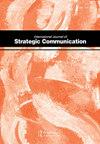COVID-19 Vaccination and Public Health Communication Strategies: An In-depth Look at How Demographics, Political Ideology, and News/Information Source Preference Matter
IF 1.9
Q1 COMMUNICATION
International Journal of Strategic Communication
Pub Date : 2022-05-27
DOI:10.1080/1553118X.2022.2039666
引用次数: 1
Abstract
ABSTRACT Widely accepted public health actions and recommendations, particularly those related to vaccines, are critical to U.S. and global responses to infectious disease pandemics, such as COVID-19. For vaccination-related efforts like those involving COVID-19 vaccines, high national compliance is needed. While initial COVID-19 vaccination uptake in the U.S. has been quite high, it quickly became apparent that demographic characteristics, political ideology, and potentially news/information sources used were associated with COVID-19 vaccination acceptance, hesitancy, and resistance. Drawing from nationally published COVID-19 public opinion polls as well as social and behavioral science related to vaccination acceptance, this study used a nationally representative sample of U.S. adults 18 years-old and older, undertaken in November–December 2020, to examine how four key demographic characteristics (sex, age, race/ethnicity, education), political ideology (liberal, moderate, conservative), and news/information source preference (liberal, conservative, balanced) were related to COVID-19 vaccination intentions, COVID-19 risk-benefit perceptions, interest and attention to COVID-19 information, self-reported level of being informed on key COVID-19 items, and trust and use of common COVID-19 information sources. Multiple associations were found, with most having important implications for strategic communication efforts related to COVID-19 vaccination and other preventive health recommendations.COVID-19疫苗接种和公共卫生传播策略:深入了解人口统计、政治意识形态和新闻/信息来源偏好的重要性
广泛接受的公共卫生行动和建议,特别是与疫苗有关的行动和建议,对美国和全球应对COVID-19等传染病大流行至关重要。对于涉及COVID-19疫苗的疫苗接种相关工作,需要国家高度遵守规定。虽然美国最初的COVID-19疫苗接种率相当高,但很快就发现,人口特征、政治意识形态和潜在的新闻/信息来源与COVID-19疫苗接种接受度、犹豫和抵抗有关。本研究利用全国公布的COVID-19民意调查以及与疫苗接种接受相关的社会和行为科学,使用了2020年11月至12月进行的具有全国代表性的美国18岁及以上成年人样本,研究了四个关键的人口特征(性别、年龄、种族/民族、教育)、政治意识形态(自由、温和、保守)和新闻/信息来源偏好(自由、保守、平衡)与COVID-19疫苗接种意图、COVID-19风险-收益认知、对COVID-19信息的兴趣和关注、自我报告的COVID-19关键项目了解程度以及对常见COVID-19信息来源的信任和使用有关。发现了多种关联,其中大多数对与COVID-19疫苗接种和其他预防性卫生建议相关的战略沟通工作具有重要意义。
本文章由计算机程序翻译,如有差异,请以英文原文为准。
求助全文
约1分钟内获得全文
求助全文
来源期刊

International Journal of Strategic Communication
Social Sciences-Sociology and Political Science
CiteScore
3.40
自引率
0.00%
发文量
39
期刊介绍:
The International Journal of Strategic Communication examines the philosophical, theoretical, and applied nature of strategic communication, which is “the purposeful use of communication by an organization to fulfill its mission.” IJSC provides a foundation for the study of strategic communication from diverse disciplines, including corporate and managerial communication, organizational communication, public relations, marketing communication, advertising, political and health communication, social marketing, international relations, public diplomacy, and other specialized communication areas. The IJSC is the singular forum for multidisciplinary inquiry of this nature.
 求助内容:
求助内容: 应助结果提醒方式:
应助结果提醒方式:


